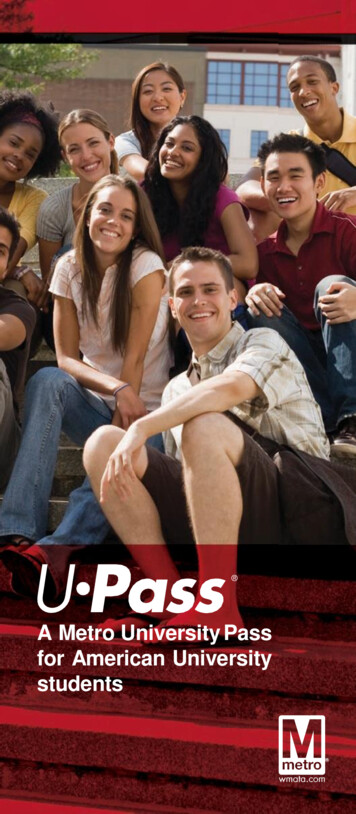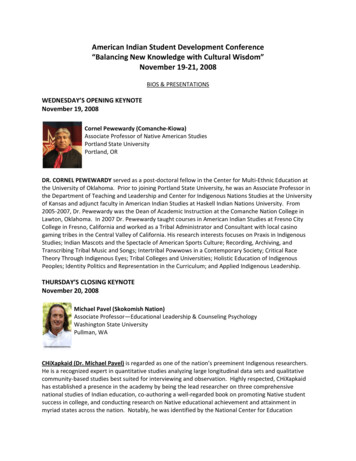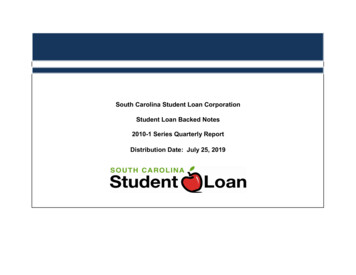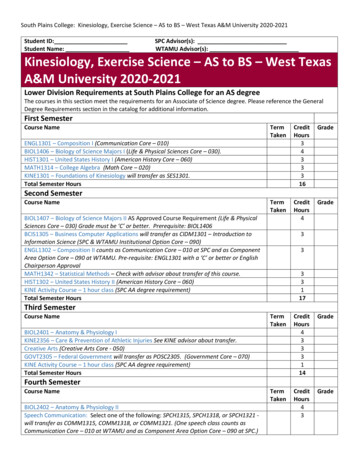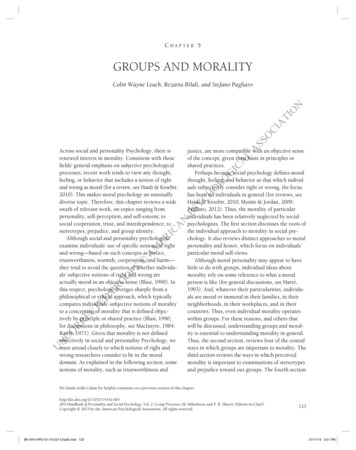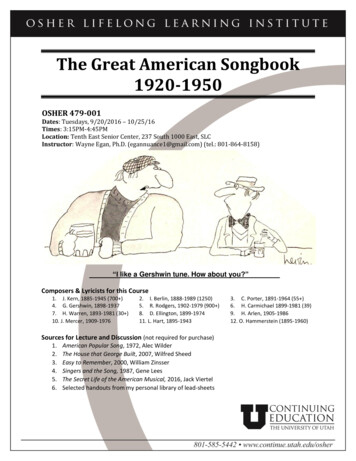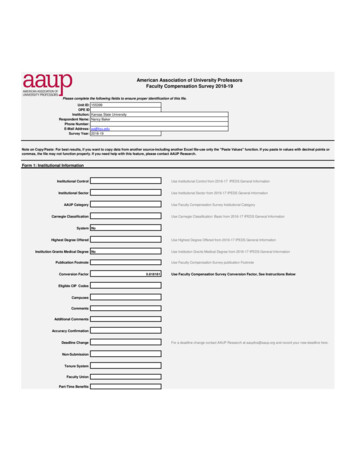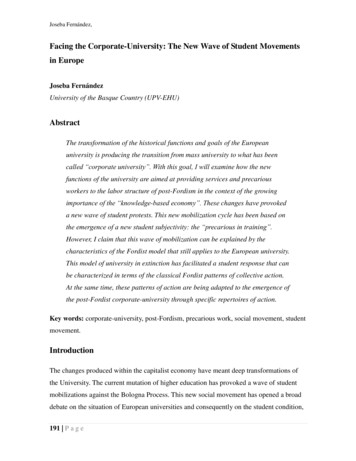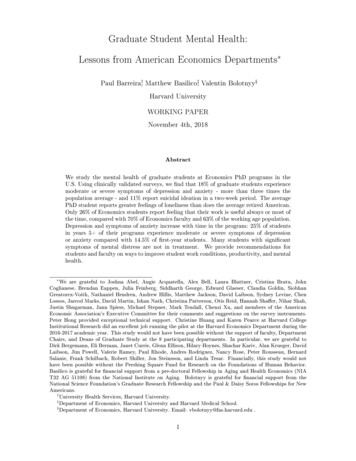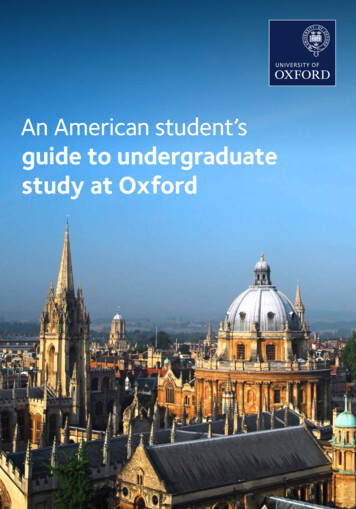
Transcription
An American student’sguide to undergraduatestudy at Oxford
Why Oxford?Oxford combines all the resources of an internationally acclaimedresearch-intensive University with the supportive and personalenvironment of our colleges. As an Oxford undergraduate you’ll bepart of one or more departments, depending on the course you’restudying. You’ll also be a member of a college – a community ofstudents and academics from many different subject areas.Whichever college you go to, you will be studying for the same ES AND HALLS1from over30faculties anddepartments‘Though the academicreputation was definitelya factor, I was reallyattracted by the collegiatestructure. Everything workson a smaller scale withconcentrated resources, aclose-knit community andhighly individual teachingwith tutors who reallytake an interest in you.’ in groups of23orfor specialisedTUTORIAL TEACHINGArchie, 2nd year
top tipsCoursesUndergraduate degrees at Oxford are more specialised thanthose at most American universities and allow you to study yourchosen course in depth. You apply for one course only, so makingthe right choice is very important. There are no major and minorsubjects at Oxford, so you can’t mix and match different courses.Although you follow one course throughout your studies thereare lots of options for specialising within your subject areas,but there is little opportunity to study electives or options fromother subjects. A course is usually only one academic subject(like Mathematics or History); but there are some courses whichcombine two or more subjects (like Physics and Philosophy). Thesejoint courses are usually not major/minor combinations – you wouldneed to demonstrate your aptitude for, and academic interest in,each subject.Most undergraduate courses are three years long. Some sciencecourses enable students to do a research-focussed fourth year togain a master’s degree. Most language courses take four years,including up to one year in a country where that language is spoken.See our full undergraduatecourse list atox.ac.uk/coursesIn the UK, the word ‘course’refers to the whole degreeinstead of it’s individualcomponents. It has thesame meaning as ‘program’in the USA.There are lots ofopportunities to study,research or work abroadwhilst studying at Oxfordox.ac.uk/students/goabroad‘Oxford is a fantastic university, renowned for academicexcellence- the teaching is world class, and being taughtby experts in my subject area in this way really appealedto me. Also, Oxford is a great city so this factored intomy decision too.’ Megan, 1st year2
CollegesOxford University is made up of colleges spread across the city of Oxford.These buildings provide accommodation, a dining hall, bar, common room,library and gardens. Every undergraduate lives in college accommodation intheir first and usually last year. It is also here that college tutors will overseeyour studies and normally arrange your tutorial teaching. The relativelysmall number of students at each college ensures a ready-made communitywhich nurtures all undergraduates’ academic development and welfare.Tutorial teachingAlongside lectures, practicals or other forms of teaching, all undergraduatestudents also attend tutorials. Around once a week in each subject studied,you will meet your tutor, usually with one or two other students, to discussyour work in depth. This personalised attention means that you will facerigorous academic challenges on a weekly basis, encouraging and facilitatingyour learning in a way that just isn’t possible in a lecture. Oxford tutorialsrequire you to think for yourself – an essential skill for academic successand something that the best employers look for in Oxford graduates.Two nations divided by a common language UK/OxfordUniversityCourseTutorModule or paperQualifications3USACollege or schoolProgramProfessorCourse or classA student’s test scorestop tips‘Tutor’ is Oxford’s name fora member of academic staff.They are specialists in theirfield, and usually activeresearchers – tutorials are thesmall group teaching that youwill have with your tutor.
Applying to OxfordEntrance RequirementsCompetition for places at Oxford is very strong, and even excellentgrades will not guarantee you a place. Our entry requirements arebased on standardised tests, such as: The SAT or ACT combined with at least three AdvancedPlacement Tests or SAT Subject Teststop tipsFor all of the testing systemsthat we accept, and to checkwhich tests and scores youwould need, seeox.ac.uk/intquals The International BaccalaureateWe don’t have a specified high school GPA requirement.Some courses have specific subject requirements, in which case youwould need to be taking any required subject as an AP, SAT SubjectTest or equivalent. Check the requirements tab of your course pageat ox.ac.uk/courses.Most students will apply straight from high school, at the beginningof their senior year. The UCAS application asks you to list the examgrades or test scores you have already achieved, and also any examsor tests you are scheduled to take. It is fine to apply before you havefinished taking the required tests or before you have received yourscores, although your expected grades should be mentioned inthe UCAS reference (see the next page for more on this).If you wish to spend up toone year in Oxford on anundergraduate course, youcan apply to a college fora place as a registeredVisiting Student:ox.ac.uk/visitingSelection criteriaWe are looking for academic achievement and academic potential.Although we take many all-round talented students, who, amongstother things, may captain sports teams, run volunteer societies,and write plays, we do not select students for their extra-curricularachievements, leadership, or for their ‘demonstrated interest’ in ourUniversity. In contrast to our US peer universities, we select onacademic criteria alone. Our academics – your future tutors – are thepeople making the admissions decisions and conducting admissionsinterviews. You can find specific selection criteria for each of ourcourses at: ox.ac.uk/criteria.4
Application processAll candidates must apply through UCAS by 15 October.All courses at Oxford start in October, almost a full year afterthe application deadline: ox.ac.uk/apply.OCTOBER: UCAS applicationUCAS is similar to the Common App – you can apply to several UKuniversities with one online application, but you can only apply for onecourse at Oxford and cannot apply to both Oxford and Cambridge in thesame year. Your school can register as a UCAS centre, or you can applyas an individual – either option is fine.In the UCAS application you provide details of your high school record,and also write a personal statement outlining why you want to study thesubject you have chosen. There is also a section for your teacher orguidance counsellor to provide a reference for you. It is very importantthat this reference includes the grades that they expect you toachieve in any exams you still have to take.Application deadline: submit by 6pm UK time on 15 October atwww.ucas.comOCTOBER/NOVEMBER: Admissions testsFor most courses, an admissions test also forms a compulsory part ofyour application. Advance registration is required for all admissionstests but they can be sat at your own school (as long as the schoolregisters in advance), or at one of several open centres in the USA. It isimportant to make these arrangements in good time, well beforethe deadline.For most admissions tests you must register by 15 October tosit the test in early November. To check the deadlines for yourcourse please visit: ox.ac.uk/testsNOVEMBER: Written workFor some courses, you also need to send in written work as part ofyour application. For exact requirements for each subject, pleasevisit ox.ac.uk/writwork.5top tipsOn your UCAS form you canchoose to apply to oneparticular college, or you canmake an ‘open’ application. Allcolleges follow the sameselection process.ox.ac.uk/collegechoiceThe personal statement isquite different to collegeessays in the US. For adviceon how to write one see:ox.ac.uk/ucasps
DECEMBER: InterviewOxford tutors carefully review each UCAS application, along with anyadmissions test or written work, in order to shortlist candidates forinterview. You will find out whether or not you have been shortlisted inlate November or early December. Candidates who are able to travel toOxford for interview are welcome to do so. If you are not able to travel,tutors may choose to interview you by Skype.top tipsCheck whether you need tosit an admissions test orsubmit written work on yourcourse page:ox.ac.uk/coursesAn Oxford admissions interview is an academic interview: in the sciences,you might be asked to solve an equation; in the humanities, you mightbe given a poem to read and analyse. We want to understand youracademic potential, and give you a chance to experience Oxford learning.ox.ac.uk/interviewsJANUARY: DecisionsYou will hear by mid-January whether or not your application has beensuccessful. If you have not yet completed all your high school qualificationsthen this offer will probably be conditional on your final grades.This is not the same as the wait list for a US university. If you achievethe grades required in a conditional offer then your place at Oxford isguaranteed. See the UCAS website for reply dates for a UK application.ox.ac.uk/outcomesBefore you arriveOur Student Information and Immigration team provides visaand immigration information to new students, and also offersan orientation programme to help you settle in:ox.ac.uk/students/new/international6
Fees and fundingMost American students pay University fees at our internationalrate, which is very competitive with US universities. Many of ourundergraduate courses are just three years long, which can significantlyreduce the cost of your degree. Our world-class resources also helpkeep your living costs low. For example, our outstanding libraries meanthat you won’t need to buy many books.US students can apply for federal student loans through the US DirectLoan Programme. These loans will fund up to your full cost of attendanceand are available for nearly all courses at Oxford. Alternatively, some USstudents choose a private student loan through Sallie Mae. If you areinterested in either loan, please review the information atwww.graduate.ox.ac.uk/us-loans before making your application.Unfortunately, we are not able to provide financial aid to internationalstudents except in certain rare circumstances. In general, internationalstudents need to be confident that they will be able to meet thecosts themselves.7top tipsFor more information onliving costs see:ox.ac.uk/funding
Living in Oxfordtop tipsThe city of OxfordOxford is both young and old. It has the youngest population of anycity in England and Wales, but also has many beautiful historic buildings.Oxford is surrounded by traditional countryside, but is also just anhour to London by train, and has excellent connections to airports.For information about eachcollege, includingaccommodation, see:ox.ac.uk/ugcollsThere is no campus as such, as most colleges and departments aresituated in and around the city centre. Amongst these buildings you willalso find world-class libraries and famous museums as well as lots ofshops, cafés, restaurants, theatres, cinemas, pubs and clubs. There areplenty of green spaces too: riverside walks, England’s oldest botanicgarden, the University Parks and college gardens.Student lifeStudent life is primarily based in the individual Oxford colleges –where you would live, at least in your first year, and make your firstfriends. There are dozens of clubs and societies in colleges, but thereare also hundreds more across the University, suitable for your levelof interest in all kinds of sports, dance, music, drama, journalism,volunteer work – or whatever else you want to do.EdinburghAccommodationAlmost all students will decide to live within theircollege for at least their first year. All colleges haveaccommodation, and this is always a single studentbedroom – there are no dormitories. After the firstyear, you may choose to stay within the college or‘live out’ with friends in another part of the city.Oxford to Londondistance: 60 milesBelfastManchesterLiverpoolBirminghamOXFORD StanstedHeathrowLondonGatwick8
After OxfordThe Careers Service offers Oxford graduates lifelong careers advice. Thisservice advertises more jobs than there are students to fill them, and canhelp you find an internship, learn business skills and land your dream job.Oxford graduates are highly valued by employers for their communication,leadership and problem-solving skills. It doesn’t matter which subject youchoose, studying at Oxford prepares you for a very broad range of careers.‘I had the opportunity to learn from faculty who have truly shapedtheir subjects and to become friends with students from around theworld. My tutorials were both challenging and yet very rewarding,while teaching me how to critically think through global issues. Mytime at the University of Oxford as an undergraduate prepared mefor later postgraduate studies in international trade and diplomacy,and now a global career that has included time at the United Nations(UN), an NGO, and a leading global asset management firm.’ Andrew from Texas, PPE graduate‘During my senior year of high school I had to make a toughdecision between choosing one of the excellent Americanuniversities my friends were planning to attend or to take aleap of faith, cross the pond and accept my offer from Oxford. Ichose to study history at Oxford and have never looked back. Tomy mind, the clearest advantage of an Oxford education is theunrivalled ability of the tutorial system to teach students howto think critically and form meaningful opinions. These skills areas integral to my success today working at a hedge fund as theywere to my success as an undergraduate studying history.’ 9Kaitlin, from New Jersey, History graduatetop tipsTake a look at Oxford’sCareers Service:www.careers.ox.ac.ukThe USA is home to thelargest number of OxfordUniversity graduates outsidethe UK, creating an extensivenetwork of alumni groups.In the USA:Over 30,000 alumniAround 40 alumni groupswww.alumni.ox.ac.uk
Finding out moreOxford’s Student Recruitment Team visits theUS every year. To find out about events nearyou check: ox.ac.uk/intvisitIf you are coming to Oxford, then we reallyrecommend you come to an open day if possible:ox.ac.uk/opendaysIf you have any questions at all, pleasecontact our admissions information team:study@ox.ac.ukCall: 44(0) 1865 28800010
Produced by the University of Oxford Public Affairs Directorate and the Undergraduate Admissions and OutreachOffice University Offices, Wellington Square, Oxford OX1 2JDPhotographs: Oxford University Images. Contributing photographers: John Cairns, PS:unlimited, Rob Judges,Whitaker Studio, Greg Smolonski, iStock/Chris Schmidt, Emily Alexander, Gurinder Punn, PS:unlimited, Phil Sayer,Whitaker Studio, Rob Judges Photography The University of Oxford 2016/17All rights reserved. No part of this publication may be reproduced, stored in a retrieval system, or transmitted, inany form or by any means, electronic, mechanical, photocopying, recording, or otherwise, without prior permission.
Most American students pay University fees at our international rate, which is very competitive with US universities. Many of our undergraduate courses are just three years long, which can significantly reduce the cost of your degree. Our world-class resources also help keep your livi
